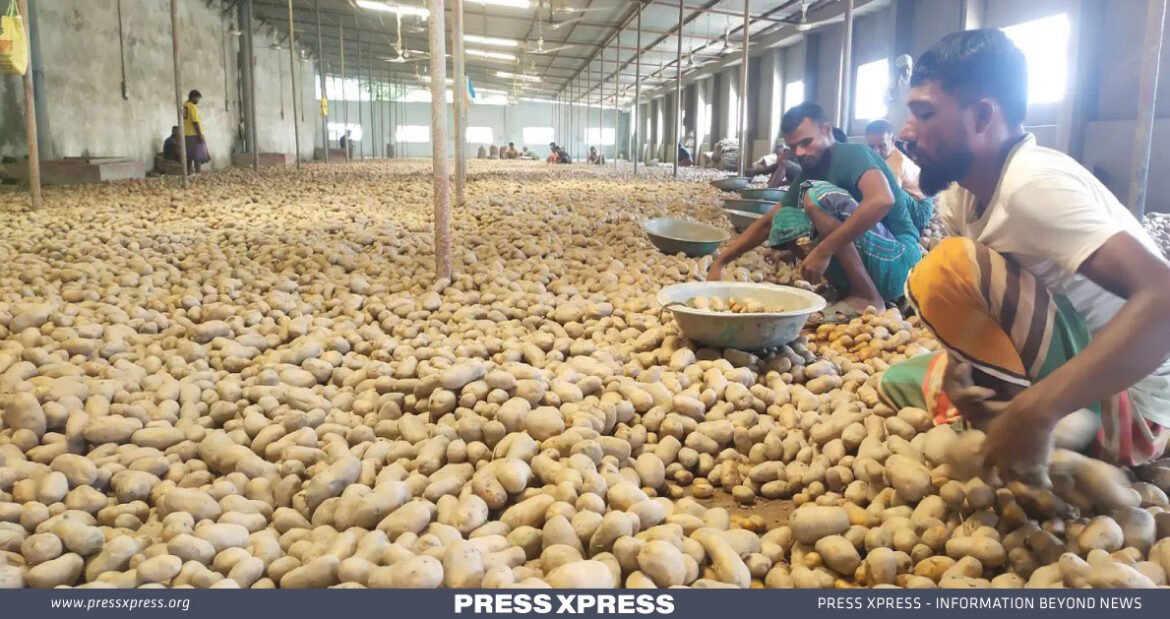Key highlights:
- Currently, government warehouses and silos can hold around 2.4 million MT, with plans to increase this capacity to 3 million MT by 2025.
- William Fellows, executive managing director at LixCap, emphasized the potential for a $440 million investment in cold storage by 2031.
- Currently, there are 405 cold storage facilities nationwide, with over 95% dedicated to potato storage.
- The government, with approval from the Palli Karma-Sahayak Foundation (PKSF), has financed two pilot plants with capacities ranging from 6 to 8 tons to support income-generating activities among farmers and middlemen involved in supplying safe food.
To enhance food grain storage safety, the government is focused on increasing cold storage capacity. Currently, government warehouses and silos can hold around 2.4 million MT, with plans to increase this capacity to 3 million MT by 2025. Additionally, there are private warehouses available for rental storage purposes.
However, Bangladesh faces significant challenges, with an annual loss of $2.4 billion attributed to a 44% post-harvest loss of fruits, crops, and vegetables due to inadequate storage and transportation facilities like temperature-controlled logistics (TCL), resulting in higher prices for consumers.
Recognizing the urgency of the situation, the government is exploring incentives to attract investment from US businesses interested in establishing cold storage facilities in Bangladesh.
These issues were deliberated upon at the Cold Chain Investment Conference 2024 held in Dhaka on February 28th, organized by the Bangladesh Investment Development Authority (BIDA) and the Bangladesh Trade Facilitation Project (BTF) in collaboration with the US Department of Agriculture.
Salman F Rahman, the prime minister’s adviser on private industry and investment, highlighted the government’s efforts to subsidize interest rates on loans for businesses operating in the sector amidst a rise in lending rates.
William Fellows, executive managing director at LixCap, emphasized the potential for a $440 million investment in the sector by 2031, offering business development advisory services and investment solutions for emerging markets.
Cold chain logistics investment can reduce the post-harvest losses significantly. Bangladesh may not need to import onions and potatoes if it can improve its cold chain. Besides saving the agricultural products, Bangladesh will see a boost in sectors like transport and packaging. Furthermore, ensuring growth and investment in the TCL industry would improve the livelihoods of farmers, help food producers meet certain requirements and create opportunities for export.
– William Fellows, executive managing director at LixCap

The Current Scenario of Cold Storage Facilities in Bangladesh
Currently, there are 405 cold storage facilities nationwide, with over 95% dedicated to potato storage. The remaining space accommodates small quantities of dry chilies, turmeric, cumin seeds, fish, garlic, and fruits.

A feasibility study conducted by the Palli Karma-Sahayak Foundation (PKSF) in 2017 highlights the increasing demand for cold storage among farmers, fisheries, and rural enterprises. There’s a growing need for short-term preservation of perishable agricultural products near rural wholesale markets. However, there’s a lack of initiatives for small-scale cold storage due to skepticism from banks and financial institutions. They cite uncertainties in grid power supply, processing, transportation barriers, and constraints as reasons for reluctance to lend to small ventures.
The conventional perception of “Cold Storage” entails large-scale facilities (2,000-5,000 tons of potato storage), requiring significant investment and high electricity bills. The unpredictable profit or loss, owing to unreliable power supply and frequent load shedding, further deters investment. Cold storage owners often resort to costly standby generators as a temporary solution, which pose reliability and safety concerns.
This discourages small farmers from investing in cold storage, as banks and lenders await successful pilot projects to demonstrate viability. The prevalence of power outages, particularly in the summer when cold storage facilities are under peak load, results in heavy financial losses for owners, operators, and clients. Moreover, this adversely affects other businesses, employees, and the national economy.

What Measures Has the Government Implemented to Address the Challenges?
The Government of Bangladesh is taking steps to convert agricultural losses into profits by promoting the establishment of mini cold storage facilities powered by solar and alternative energy sources through the Sustainable and Renewable Energy Development Authority (SREDA). The government, with approval from the Palli Karma-Sahayak Foundation (PKSF), has financed two pilot plants with capacities ranging from 6 to 8 tons to support income-generating activities among farmers and middlemen involved in supplying safe food.
The adoption of solar-powered mini cold storage is gaining popularity among farmers in both on-grid and off-grid areas. In 2017, a successful pilot plant was established in Jhenaidah with grants from IDCOL R&D.
Advancements in Bangladesh’s Cold Chain Infrastructure
Government Initiatives:
- Financing of two pilot plants: 6-8 tons capacity
- Conversion of agricultural losses into profits
- Promotion of mini cold storage facilities powered by solar and alternative energy sources
Adoption of Solar-Powered Mini Cold Storage:
- Gaining popularity among farmers in both on-grid and off-grid areas
Successful Pilot Plant:
- Established in Jhenaidah in 2017
- Grants from IDCOL R&D
Recently, Venture37, a US-based agricultural development organization, has entered a memorandum of understanding (MoU) with City Bank Capital to collaborate on enhancing Bangladesh’s cold chain infrastructure. This collaboration aims to improve the efficiency of the cold chain network, building on Venture37’s involvement in providing technical assistance under the USDA’s Bangladesh Trade Facilitation Project.
The USDA’s initiatives include a $27 million project launched in 2021 to support the government’s efforts in facilitating cross-border trade in agricultural goods by streamlining import and export procedures and enhancing laboratory and warehouse capacity.
USDA Initiatives:
- $27 million project launched in 2021
- Support for cross-border trade in agricultural goods
- Streamlining import and export procedures
- Enhancing laboratory and warehouse capacity
Venture37 Collaboration:
- Memorandum of Understanding with City Bank Capital
- Focus on enhancing Bangladesh’s cold chain infrastructure
- Technical assistance under the USDA’s Bangladesh Trade Facilitation Project
Additionally, the Bangladesh Institute of Nuclear Agriculture (BINA) is progressing with plans to establish the Bangabandhu Gamma Irradiation Center in Gazipur to extend the shelf life of onions. Gamma irradiation technology can effectively prolong the shelf life of onions by up to 3-4 months, reducing post-harvest damage and disinfection needs. The construction of the Gamma Irradiation Center is estimated to cost Tk150 crores.
In conclusion, the narrative surrounding cold storage facilities in Bangladesh underlines both the critical need for their expansion and the innovative solutions being pursued to overcome existing challenges. From the adoption of solar-powered mini cold storage units to strategic partnerships aimed at boosting the cold chain network, there’s a palpable momentum driving progress toward a more resilient agricultural sector.


